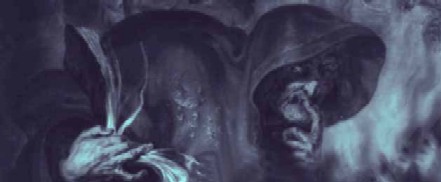For now am I worshipped.
Thou shall have me faire bothe day and nighte
And ever while I live as faire and brighte.."

Click the Picture of the fair Dame to Hear Dame Ragnell
Dame Ragnell:
Searching for the Truth

The story begins with Arthur hunting a stag in the forest. After the kill of the stag he stumbles upon a giant of a knight, Sir Gromer Somer Joure. In order to live, the knight makes a deal with Arthur. If he returns in a year and a day with an answer to the question "What do women want?" his life will be spared. Arthur and his confidant, Sir Gawain, ride throughout the land with two books. In these books they write down the answers they receive from women all over the land to Sir Gromer's question. Upon comparing their books, Arthur and Gawain realize that they do not have any two answers that are the same. Knowing that he will soon have to face Sir Gromer, Arthur rides out with the book of answers, knowing that he may never see his kingdom again. As Arthur travels through the forest to face Sir Gromer Somer Joure with his book of answers, he knows his fate is sealed. Death is at his head unless he can find an answer that will save his life. Like the answer to his prayers, the hag sits waiting for him: "She was as ungodly a creature/As evere man sawe witheoute mesure." (page 331, lines 228-229) To Arthur she is such a disgusting sight to see that when she tells him her price for the answer is her marriage to Gawain, he feels too much pity for Gawain to agree instantly. However, like her historical image, the hag gets what she wants when Gawain observes the comitatus and agrees to do whatever it takes to protect Arthur from Sir Gromer.
Once Arthur tells Dame Ragnell that Gawain has agreed to marry her in return for the answer to the fateful question, Dame Ragnell provides the answer to her brother's question: "We desiren of men above alle manner thing/To have the sovereinty, without lesing,/Of alle, bothe highe and lowe." (page 336, lines 422-424) At this point in the story one must wonder about Dame Ragnell. How does she know Arthur has been the victim of her brother? Could Sir Gromer have worked with his sister in order to break the spell placed on her by her stepmother? Do they have enough faith in the reputation of Sir Gawain to know that he will never allow any harm to come to his king? Is Dame Ragnell as innocent as we are led to believe at this time in the story? As predicted, the mysterious woman in the woods has the right answer and Sir Gromer allows Arthur to live, cursing his sister in the process.
On their wedding night we see that Sir Gawain absolutely holds true to his word and fulfills all of his husbandly duties. Instantly she becomes a beautiful maiden whom Gawain cannot recognize as his foul wife. Dame Ragnell tells Sir Gawain that she can be either foul by night and fair by day or fair by night and foul by day - which is his choice? Torn by the repercussions of the two choices, Sir Gawain tells Dame Ragnell that the choice is hers to make: "The choise I put in your fist./Even as ye woll, I put it in your hand,/Lose me when ye list, for I am bond." (page 343, lines 678-680) The truth is then revealed to Gawain when the fair maiden before him tells him that she will be a fair maiden for him in the day and the night because he has given her sovereignty over himself. Gawain has given Dame Ragnell the freedom to choose - something women knew very little of in this world. Much to his pleasure, Gawain now has a beautiful wife instead of an ugly hag, and it is all the result of his noble and chivalrous behavior.
Looking at Dame Ragnell, one must wonder many different things. Does Dame Ragnell
always intend on marrying Sir Gawain? Has she ever really been cursed? Where is the proof
of this curse? Apparently she can become fair at some point on her own. Does this mean she
too practices magic? How do we know Sir Gromer and Dame Ragnell are not one in the same?
How do we know Dame Ragnell is not really Morgana LeFey? Who IS Dame Ragnell? What exactly
is her goal in this story? Does Dame Ragnell simply want to show the men with the highest
power the way to fulfill a woman's true desire? Is she, like countless political women,
plan to change things from the inside of hierarchy? Dame Ragnell may not have been quite
the innocent maiden she was portrayed as in her marriage to Sir Gawain. The lessons she
teaches, and the awareness she brings to the court of Arthur are definitely timeless
lessons that human beings are constantly being taught. Never judge a book by its cover -
you never know what it might really have to say.


